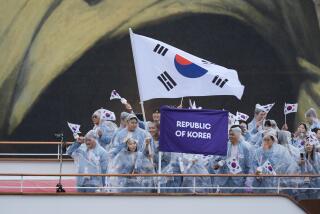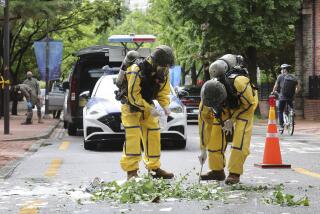Warm-up for ’88 Olympics Brings Prestige, Contacts : S. Korea: An Asian Games Winner
- Share via
SEOUL, South Korea — Although the 10th Asian Games do not begin until today, their success for South Korea already is assured.
The gains from organizing the Asian Games, which are seen here as mainly a warm-up for the 1988 Olympic Games, include new prestige in Asia as well as new contacts with Communist nations that only five years ago would have been unimaginable here.
And in two years, the Olympics promise to give a nation “with 5,000 years of history of always being trampled upon by its neighbors . . . our place on the world map,” in the words of former Sports Minister Lee Yong Ho.
“After we stage the Asian Games and the Olympics, a lot more people around the world are going to know where we are and have a more positive feeling about our country,” Lee said in an interview this week.
” . . . We are becoming (a significant) nation--economically, culturally and militarily. The Olympics won’t alter those facts, but it will change the images many countries hold about us, including the Soviet Union and China,” he said.
Boost to Self-Image
For the South Koreans themselves, hosting the two events will repair a “lack of self-confidence as a nation” and a self-image as a weak, impoverished and insignificant nation, Lee said. The result will be a restoration of pride in Korea’s rich culture, which centuries of poverty have eroded, he predicted.
In addition to about 160,000 tourists expected to visit the country during the Asian Games, South Korea’s new stature is drawing more visits by foreign tourists and helping the nation’s businessmen, Lee said.
“Our traders are having an easier time selling Korean products,” he said.
Lee said the two sports festivals will stimulate the South Korean people, who have already achieved an “upper middle-class” economic status in the world, to seek “still further national development.”
The Asian Games have even precipitated a rare, but probably temporary, interlude of political harmony between President Chun Doo Hwan, who seized power in 1980, and opposition political parties. All political parties here have declared their support for the games and have even pledged to halt condemnations of each other for the 15-day duration.
May Ease Attack Threat
Ultimately, South Korean officials say, the hosting of the two sports festivals, and the contacts with Communist countries arising from them, may mean a lessening of the threat of attack by the Communist North Korean troops poised across a frontier only 25 miles north of the capital.
And that, in turn, could benefit the United States, which, with 40,000 American troops stationed here now, is the principal guarantor of South Korea’s security,
Suh Keuk Sung, assistant minister of the government’s Unification Board, said Soviet and Chinese participation in the 1988 Olympics could weaken North Korea’s ties with its only two military allies, thus lessening the military threat to South Korea.
“At the moment, North Korea has developed the capability of invading South Korea without the support of its military allies, China and the Soviet Union,” he said. “But the north cannot sustain a war without their help.”
If the Soviet Union and China participate in the Olympics, North Korea will be forced to find ways to at least coexist peacefully with the south, rather than seeking its destruction, he said.
The presence here now of a 520-member delegation of athletes and officials, and 80 reporters, from China, South Korea’s enemy in the Korean War of 1950-53, as well as government officials from the Soviet Union and all other East European Communist countries, has already given the Seoul government one of its biggest diplomatic coups ever.
The Soviets’ sports minister, Marat V. Gramov, is scheduled to attend the Asian Games opening ceremony today, and the East European officials are here to attend meetings of the International Olympic Committee.
None of the Communist nations--supposedly spiritual allies of North Korea, which urged all Communist countries to follow it in boycotting the sports festival--maintain diplomatic relations with Seoul. And were it not for the Asian Games and the Olympics, they might still have developed no contacts with Seoul.
Now the outlook, Juan Antonio Samaranch, president of the International Olympic Committee, told a news conference here Thursday, is for “all the socialist countries in Europe to take part in the 1988 Olympic Games.”
“Very strong teams from those countries were in South Korea last year and this year taking part in very, very important competitions,” he noted.
‘Helpful’ for Olympics
Samaranch called the participation of China in the Seoul Asian Games “really helpful for the 1988 Olympic Games.”
In 1981, when Seoul won its bid to host the 1988 Olympiad, no contacts at all had been established with any Communist country except for North Korea itself.
Although other Asian Communist nations--Vietnam, Cambodia, Laos, Afghanistan and Mongolia--are not participating in the Asian Games, South Korean officials called their absence a minor disappointment that is outweighed completely by the Soviet and Chinese presence.
North Korea has hardened its propaganda line against the south, broken off four separate sets of talks with Seoul aimed at promoting human, economic, parliamentary, and political contacts, and, South Korean officials fear, may have launched a campaign of terror against the south.
Kang Min Chang, director of the National Police, blamed a terrorist bomb attack at Seoul’s Kimpo International Airport last Sunday on North Korean agents. The bomb killed five Koreans and injured more than 30 others. Kang later acknowledged that the police have not ruled out the possibility that “international terrorists” may have been responsible.
The lack of clear-cut support from other Communist countries has forced North Korea to drop its blanket objection to having the Olympics in Seoul. It has demanded instead that it be allowed to co-host the 1988 Games. But only Nicaragua and Cuba have supported Pyongyang by declaring that they will boycott the Olympiad if the International Olympic Committee refuses to accept that demand.
So far, a total of 4,763 officials and athletes from 25 countries have committed themselves to participate in the Asian Games, dwarfing the scale of South Korea’s biggest previous international event, last year’s annual conference of the International Monetary Fund. That attracted about 1,000 world bankers and finance chiefs.
Not everyone in South Korea is happy with the Asian Games.
Students opposed to Chun have been carrying out nearly daily demonstrations against the sports festival. At least 10,250 students from 28 schools were involved in anti-government, anti-games protests during the past week alone.
Chun’s authoritarian government has cracked down hard on dissenters in an effort to ensure not only the security of the visiting athletes and officials but also to create an image of domestic harmony. Last month, more than 150 members of radical student groups were arrested and a nationwide alert was declared for all of the country’s 100,000-man police force.
This week, police raided more than 100 campuses to round up weapons and propaganda materials. And, to discourage demonstrations, five universities were shut down for the duration of the games.
Security has been heavy in hotels in which foreigners are staying, with as many as four plainclothesmen posted on each floor.
So far, visiting athletes and officials have disappointed South Korean shopkeepers and restaurant owners by staying inside the Asian Games Athletes’ Village, for the most part.
Chun, who underscored the importance the government places on the Asian Games by visiting the scene of the Kimpo Airport terrorist attack and inspecting security measures at the Athletes’ Village last Monday, has launched a publicity campaign to whip up popular support for the games.
Government-sponsored slogans on television urge, “Let’s make ’86 and ’88 a Success to Become Cultured Citizens of the World.”
Junior high school students have been mobilized to stand on street corners with signs urging citizens to “be friendly and courteous and make the city clean.”
The Asian Games here promise to be the largest and by far the most sophisticated in the 36-year history of the quadrennial sports event. Modern computer and telecommunications equipment has been installed for a trial run for the 1988 Olympiad.
Organizers have readied 32 venues. All of the sites, including the $73-million, 70,000-seat Chamshil Olympic Stadium, also will be used for the 1988 Olympics.
More to Read
Go beyond the scoreboard
Get the latest on L.A.'s teams in the daily Sports Report newsletter.
You may occasionally receive promotional content from the Los Angeles Times.






